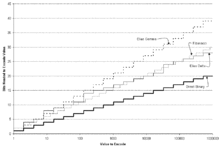This article needs additional citations for verification. (November 2011) |


In data compression, a universal code for integers is a prefix code that maps the positive integers onto binary codewords, with the additional property that whatever the true probability distribution on integers, as long as the distribution is monotonic (i.e., p(i) ≥ p(i + 1) for all positive i), the expected lengths of the codewords are within a constant factor of the expected lengths that the optimal code for that probability distribution would have assigned. A universal code is asymptotically optimal if the ratio between actual and optimal expected lengths is bounded by a function of the information entropy of the code that, in addition to being bounded, approaches 1 as entropy approaches infinity.
In general, most prefix codes for integers assign longer codewords to larger integers. Such a code can be used to efficiently communicate a message drawn from a set of possible messages, by simply ordering the set of messages by decreasing probability and then sending the index of the intended message. Universal codes are generally not used for precisely known probability distributions, and no universal code is known to be optimal for any distribution used in practice.
A universal code should not be confused with universal source coding, in which the data compression method need not be a fixed prefix code and the ratio between actual and optimal expected lengths must approach one. However, note that an asymptotically optimal universal code can be used on independent identically-distributed sources, by using increasingly large blocks, as a method of universal source coding.